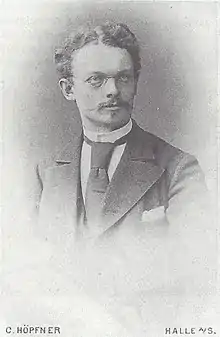
Paul Kraske as a student
Paul Kraske (2 June 1851, Berg, Province of Silesia – 15 June 1930, Freiburg im Breisgau) was a German surgeon.
He studied medicine at the universities of Halle and Leipzig, receiving his doctorate at Halle in 1874. While a student, he served as a volunteer soldier in a fusilier regiment during the Franco-Prussian War. After graduation, he spent several years as an assistant to Richard von Volkmann at the surgical clinic in Halle, then from 1883 to 1919 was a professor and head of the surgical clinic at the University of Freiburg.[1][2]
He held a particular interest in colorectal cancer, and is remembered for introducing a transsacral approach for the extirpation of cancers of the rectum ("Kraske's operation").[3]
Selected works
- Beiträge zur Lehre von dem Einflusse der Nerven auf die Ernährung der Gewebe, 1874 – Study on the influence of nerves involving the nutrition of tissues.
- Experimentelle Untersuchungen ueber die Regeneration der quergestreiften Muskeln, 1878 – Experimental studies on the regeneration of striated muscles.
- Die sacrale Methode der Exstirpation von Mastdarmkrebsen und die Resectio recti, 1887 – The sacral method for extirpation of rectal cancers and resection of the rectum.[1][3]
References
- 1 2 Paul Kraske Catalogus Professorum Halensis
- ↑ Paul Kraske at Who Named It
- 1 2 Kraske's operation Who Named It
This article is issued from Wikipedia. The text is licensed under Creative Commons - Attribution - Sharealike. Additional terms may apply for the media files.